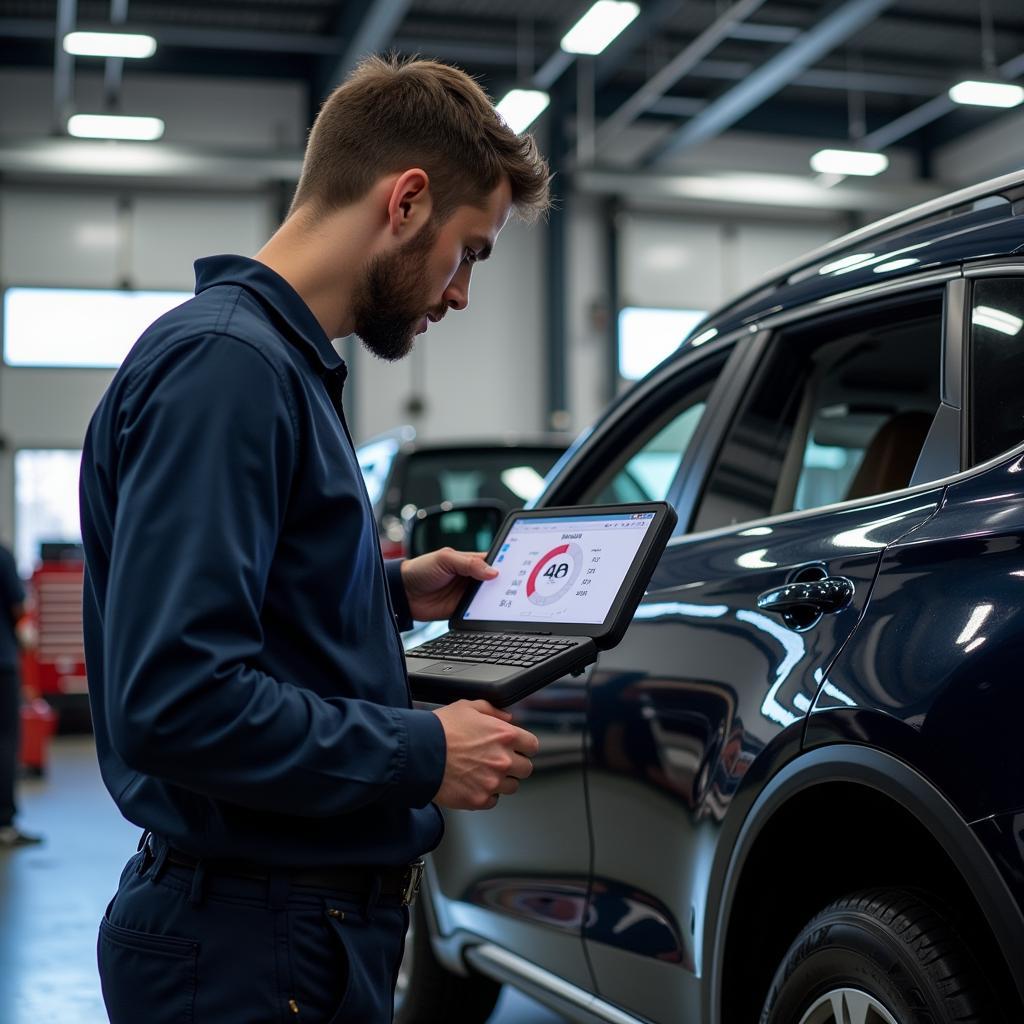Finding the Best Car Diagnostic Tester can feel like searching for a needle in a haystack, especially with so many options flooding the market. Whether you’re a seasoned mechanic or a car enthusiast wanting to troubleshoot your vehicle, having the right diagnostic tool is essential. This guide will navigate you through the essentials of car diagnostic testers, helping you make an informed decision.
 Car Diagnostic Tester Comparison Chart
Car Diagnostic Tester Comparison Chart
Understanding the Importance of Car Diagnostic Testers
Modern vehicles are complex machines, reliant on intricate electronic systems. When a problem arises, a car diagnostic tester acts like a detective, pinpointing the root cause. These handy devices read trouble codes stored in your car’s computer, offering valuable insights into:
- Engine Performance: Identify issues related to fuel efficiency, ignition timing, and emissions.
- Transmission Faults: Detect problems with shifting, slippage, or clutch performance.
- ABS System: Diagnose issues with anti-lock brakes, ensuring optimal safety.
- Airbag System: Analyze airbag sensors and modules, ensuring proper deployment in case of a collision.
Using a car diagnostic tester can save you time and money by avoiding unnecessary repairs and providing accurate information for informed decisions.
Types of Car Diagnostic Testers
Before diving into the features, it’s crucial to understand the different types of car diagnostic testers available:
1. OBD Code Readers
OBD (On-Board Diagnostics) code readers are entry-level devices that primarily read and clear basic diagnostic trouble codes (DTCs). They are generally affordable and suitable for car owners who want to understand simple engine-related issues.
2. OBD Scanners
OBD Scanners offer more advanced features compared to basic code readers. These tools can access live data streams from your car’s sensors, providing real-time information on engine parameters, sensor readings, and more.
3. Professional-Grade Scanners
As the name suggests, professional-grade scanners are comprehensive diagnostic tools used by mechanics and experienced technicians. They boast advanced functionalities like bi-directional control (sending commands to the vehicle’s systems for testing), programming modules, and accessing manufacturer-specific data.
 Professional Mechanic Using a Car Diagnostic Tester
Professional Mechanic Using a Car Diagnostic Tester
Key Features to Consider
When choosing a car diagnostic tester, consider your specific needs and budget. Here are key features to look for:
- Vehicle Coverage: Ensure the tester supports your vehicle’s make, model, and year.
- Code Reading & Clearing: The ability to read and clear DTCs is essential.
- Live Data Streaming: Accessing real-time data from vehicle sensors provides valuable insights into performance.
- Bi-Directional Control: This feature allows for testing components by sending commands to the vehicle’s systems.
- Special Functions: Some testers offer specialized functions like ABS bleeding, injector coding, and key programming.
- User Interface & Display: A user-friendly interface and clear display are crucial for ease of use.
- Connectivity & Updates: Consider testers with Bluetooth or WiFi connectivity for software updates and data logging.
Choosing the Right Tester for You
Selecting the best car diagnostic tester depends on your individual requirements:
- Car Owners: For basic diagnostics and troubleshooting, an OBD code reader or a mid-range OBD scanner will suffice.
- DIY Enthusiasts: If you enjoy tinkering with your vehicle and performing more advanced repairs, opt for a feature-rich OBD scanner with live data streaming and potentially some bi-directional control capabilities.
- Professional Mechanics: Professional-grade scanners are a must-have for mechanics and technicians, offering comprehensive diagnostic and programming functionalities.
Expert Insights
“Investing in a reliable car diagnostic tester is a smart move, even for casual car owners. It empowers you to understand your vehicle better and make informed decisions about repairs,” says John Miller, Senior Automotive Technician at Ace Mechanics.
Conclusion
Finding the best car diagnostic tester doesn’t have to be daunting. By understanding your needs, researching available options, and considering the key features, you can choose a tester that fits your budget and empowers you to take control of your vehicle’s health.
FAQs
1. Can I use any car diagnostic tester on any car?
Car diagnostic testers have varying compatibility. It’s crucial to check the manufacturer’s specifications to ensure it supports your vehicle’s make, model, and year.
2. What is the difference between an OBD code reader and an OBD scanner?
OBD code readers primarily read and clear DTCs, while OBD scanners offer more advanced features like live data streaming and some bi-directional control capabilities.
3. Do I need a professional-grade scanner for basic car maintenance?
For basic maintenance tasks, a professional-grade scanner is usually not necessary. An OBD code reader or a mid-range OBD scanner will suffice.
4. How often should I use a car diagnostic tester?
It’s recommended to use a car diagnostic tester whenever your check engine light illuminates or if you experience any unusual vehicle behavior.
5. Can a car diagnostic tester fix problems with my car?
Car diagnostic testers diagnose problems but don’t fix them. They provide valuable information to help you understand the issue and seek appropriate repairs.
Need help choosing the best car diagnostic tester for your needs?
Contact us via WhatsApp: +1(641)206-8880, Email: [email protected]. Our team of experts is available 24/7 to assist you.

Leave a Reply